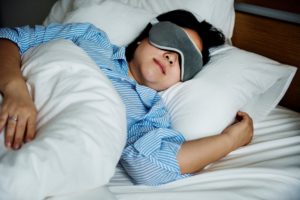When you buy through our links, we may earn a commission. Products or services may be offered by an affiliated entity. Learn more.
How Trauma Affects Dreams
Dreams often reflect what we see and feel while we’re awake, so after a traumatic experience it’s common to have nightmares and anxiety dreams. The content of these disturbed dreams often incorporates similar feelings and sensations to those experienced during the trauma.
Why Does Trauma Affect Dreams?
While there isn’t broad consensus as to why trauma affects our dreams, scientists have long wondered about this connection. Sigmund Freud, the founder of psychoanalysis, offered an early perspective, suggesting that dreams allow a view into the unconscious. He proposed that dreams protected sleep by containing the anxiety associated with repressed desires.
Later hypotheses were developed in response to repetitive nightmares experienced by war veterans. Researchers thought that dreams allowed people to revisit and attempt to work through old trauma. Nightmares were often seen as a failure to work through or master the trauma. Other researchers thought nightmares were a way in which the mind transformed shame associated with the traumatic event into fear.
While science has come a long way since Freud, more recent hypotheses are surprisingly consistent with these early ideas. Many neuroscientists and psychologists believe that dreams help to integrate our experiences into long-term memory, a process called memory consolidation. When our experiences are traumatic, dreams may reflect the body’s attempt to cope and learn from these situations
Dreams can simulate threatening events and allow us to try out different responses. Being exposed to threats while safely asleep may reduce our fears and allow access to other areas of the brain important in creativity and decision making. This idea is supported by research that demonstrates that we are more likely to approach threatening situations in our dreams than to avoid them.
Nightmares and PTSD
Nightmares are a pretty common experience, with between 4 and 10% of the population having nightmares weekly. After experiencing a traumatic event, nightmares are even more common.
Nightmares may be an intense expression of the body working through traumatic experiences, so intense that the nightmare causes the sleeper to wake up. Nightmares may also represent a breakdown in the body’s ability to process trauma. Fortunately, for most people trauma-related nightmares subside after a few weeks or months.
During a frightening event, the body’s fight-flight-freeze response is activated in order to protect us from harm. We become hypersensitive to danger as the body releases stress hormones, our pupils dilate, and our heart rate increases. After we’ve had time to process a traumatic experience, this alarm system usually quiets and returns to normal functioning.
Long-term, repetitive nightmares are linked to difficulties in reducing the brain’s fear response combined with chronic hyperarousal. The fight-flight-freeze response can remain activated long after a traumatic experience has ended.
While not all people who have repetitive nightmares are diagnosed with a mental health disorder, these nightmares are a common experience in people diagnosed with post-traumatic stress disorder (PTSD). It’s thought that less than 10% of trauma victims develop PTSD.
PTSD is a disorder that develops following a traumatic event. People diagnosed with this disorder have recurrent and involuntary memories of the event, which may come during the day (e.g. flashbacks) or during sleep (nightmares). People with PTSD often avoid both external reminders (people, places, activities) and internal memories, thoughts, or feelings about the event. People around them may notice mood changes as they become more easily startled and hyper aware of potential danger.
Looking to improve your sleep? Try upgrading your mattress.
Can Nightmares Cause Trauma?
Vivid dreams or waking up with clear memories of nightmares can be an unsettling experience. While the hypothesis that nightmares can cause trauma may not be the subject of a significant amount of research, the answer to this question may depend on the way trauma is defined.
What experiences are considered traumatic has changed over time. Early on, trauma was thought to only be possible when someone was awake and psychologists reserved this label for events that fell outside the range of normal human experiences. Later definitions have broadened the definition of trauma, acknowledging the many sources of traumatic experiences and the effect of cumulative traumas.
Currently, the Diagnostic and Statistical Manual of Mental Disorders (DSM–5) indicates that trauma can be experienced either directly or indirectly. This means that we don’t have to experience something first hand to develop trauma. For example, teachers, counselors, and psychologists may develop secondary or vicarious trauma through repeatedly hearing about the traumas experienced by those they serve. Whether indirect trauma can come from dreams may still be an open question.
Whether nightmares can cause trauma may also depend on a person’s culture. Historically, Western dream theories focus on how waking life affects dream content. In other cultures, including several Native American traditions, there is less distinction between the dreaming and waking worlds and dreams can significantly affect waking life. Dreams have powerful spiritual connotations in many cultural traditions, so it’s certainly possible that dreams can be a traumatic experience for many.
Treatment for Nightmares
After a traumatic experience, many people want to forget about what happened and move on. Unfortunately, trying to forget or suppress thoughts and feelings may make trauma-related nightmares more frequent.
An essential part of coping with trauma is knowing when to ask for help. Doctors, counselors, and therapists are trained in treating nightmares and other consequences of a traumatic event.
Having nightmares and difficulty sleeping are normal experiences after crises and trauma and many people recover from trauma-related dreams without treatment. For others, these issues may raise concerns about the development of a more serious condition such as PTSD.
While there are some medications that can help with chronic nightmares, many experts recommend starting with trauma-focused psychotherapy or counseling. Therapies for repetitive nightmares may involve desensitization and exposure therapy, image rehearsal therapy (IRT) or lucid dreaming.
- Desensitization and exposure therapies: These approaches use controlled exposure to fearful thoughts and memories in order to reduce emotional reactions. Relaxation techniques are often taught to provide tools for calming down during and after exposure.
- Image rehearsal therapy (IRT): IRT involves writing down a nightmare and turning it into a story or script. The story is then rewritten in a way that resolves the dilemma or crisis and this new story may be read before bedtime.
- Lucid dreaming: This approach to the treatment of nightmares involves exploring ways to gain awareness of when a person is dreaming. Once a person is able to understand when they’re dreaming, they may be able to improve or resolve events within their dreams.
Sleep Hygiene After Trauma
In addition to seeking professional support when coping with the effects of trauma, it may be helpful to consider strategies to support healthy sleep hygiene.
- Remember that symptoms may be normal: Immediately after having a traumatic experience, it’s normal to have difficulty sleeping. Be gentle on yourself and remember that your body is attempting to process and cope with the event.
- Maintain your usual sleep routine: Sleep and routine go hand in hand. After trauma it may be tempting to withdraw or change our normal daily activities. Try to keep to your usual sleep routine to give your body the best chance for a restful night.
- Relax before bed: Instead of trying to pressure yourself into falling asleep, focus on finding ways to calm your mind and body before bed. Turn off electronics and try some relaxation methods that may help you fall asleep.
- If you can’t sleep, don’t stay in bed: Staying in bed when you can’t sleep can create an unhelpful association between the bed and sleeplessness. If you find yourself lying awake for more than 20 minutes, try getting out of bed and doing something relaxing, like reading a book or listening to gentle music.
Experiencing trauma can increase the risk of a multitude of mental and physical health issues, including suicide. If you or someone you know is in crisis, the National Suicide Prevention Lifeline provides 24/7, free and confidential support.
National Suicide Prevention Lifeline
1-800-273-8255

Still have questions? Ask our community!
Join our Sleep Care Community — a trusted hub of product specialists, sleep health professionals, and people just like you. Whether you’re searching for the perfect mattress or need expert sleep advice, we’ve got you covered. Get personalized guidance from the experts who know sleep best.
References
13 Sources
-
Greenberg, R., Pearlman, C. A., & Gampel, D. (1972). War neuroses and the adaptive function of REM sleep. The British journal of medical psychology, 45(1), 27–33.
https://onlinelibrary.wiley.com/doi/10.1111/j.2044-8341.1972.tb01416.x -
Nielsen, T., & Levin, R. (2007). Nightmares: a new neurocognitive model. Sleep medicine reviews, 11(4), 295–310.
https://linkinghub.elsevier.com/retrieve/pii/S108707920700041X -
Perogamvros, L., Dang-Vu, T. T., Desseilles, M., & Schwartz, S. (2013). Sleep and dreaming are for important matters. Frontiers in psychology, 4, 474.
https://pubmed.ncbi.nlm.nih.gov/23898315/ -
Scarpelli, S., Bartolacci, C., D’Atri, A., Gorgoni, M., & De Gennaro, L. (2019). The functional role of dreaming in emotional processes. Frontiers in Psychology, 10, 459.
https://pubmed.ncbi.nlm.nih.gov/30930809/ -
Revonsuo A. (2000). The reinterpretation of dreams: an evolutionary hypothesis of the function of dreaming. The Behavioral and brain sciences, 23(6), 877–1121.
https://www.cambridge.org/core/product/identifier/S0140525X00004015/type/journal_article -
Malcolm-Smith, S., Koopowitz, S., Pantelis, E., & Solms, M. (2012). Approach/avoidance in dreams. Consciousness and cognition, 21(1), 408–412.
https://linkinghub.elsevier.com/retrieve/pii/S1053810011002790 -
Levin, R., & Nielsen, T. A. (2007). Disturbed dreaming, posttraumatic stress disorder, and affect distress: a review and neurocognitive model. Psychological bulletin, 133(3), 482–528.
http://doi.apa.org/getdoi.cfm?doi=10.1037/0033-2909.133.3.482 -
Gieselmann A, Ait Aoudia M, Carr M, et al. Aetiology and treatment of nightmare disorder: State of the art and future perspectives. J Sleep Res. 2019;28(4):e12820. doi:10.1111/jsr.12820
https://pubmed.ncbi.nlm.nih.gov/30697860/ -
Breslau N. (2009). The epidemiology of trauma, PTSD, and other posttrauma disorders. Trauma, violence & abuse, 10(3), 198–210.
http://journals.sagepub.com/doi/10.1177/1524838009334448 -
American Psychiatric Association. (2013). Posttraumatic stress disorder. In Diagnostic and statistical manual of mental disorders (5th ed.).
https://psychiatryonline.org/doi/book/10.1176/appi.books.9780890425596 -
May, C. L., & Wisco, B. E. (2016). Defining trauma: How level of exposure and proximity affect risk for posttraumatic stress disorder. Psychological trauma : theory, research, practice and policy, 8(2), 233–240.
http://doi.apa.org/getdoi.cfm?doi=10.1037/tra0000077 -
Krippner, S., & Thompson, A. (1996). A 10-facet model of dreaming applied to dream practices of sixteen Native American cultural groups. Dreaming, 6(2), 71–96.
http://doi.apa.org/getdoi.cfm?doi=10.1037/h0094448 -
Wegner, D. M., Wenzlaff, R. M., & Kozak, M. (2004). Dream rebound: the return of suppressed thoughts in dreams. Psychological science, 15(4), 232–236.
http://journals.sagepub.com/doi/10.1111/j.0963-7214.2004.00657.x



















